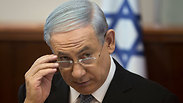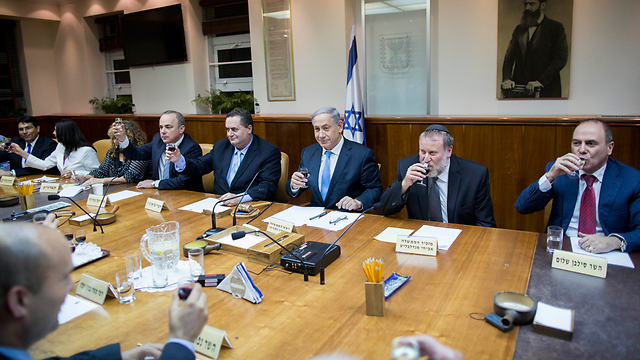
Security cabinet must not turn into a debate club
Analysis: A cabinet comprised of more than half of the government ministers, most of whom are unfamiliar with security issues, will be unable to function properly – just like during the Second Lebanon War and Operation Protective Edge.
A war or a major military battle could break out without any warning and spread to more than one arena; the growing diplomatic isolation is already inflicting economic, diplomatic and academic damage; in the future, Israel may be hit with economic and diplomatic sanctions like the apartheid regime in South African at the time; and most importantly, Israel is losing the legitimacy it has from the world to use the IDF's full force for self-defense.
We already experienced the serious results of this process during and after Operation Protective Edge. Therefore, Prime Minister Benjamin Netanyahu must immediately form a functioning security cabinet, which will be different from previous cabinets.
What does this mean?
In order for the security cabinet (the Ministerial Committee on National Security Affairs) to function properly, the prime minister must convene it every week or two. If not for the purpose of making decisions, then in order to keep its members up to date on the intelligence situation and the IDF's abilities. The new cabinet members must take, without any shame, an advanced study class which will be delivered by professionals in the areas in which they are meant to make decisions. That way, they won't be able to say that they "didn't know" or "didn't see" like they did in the tunnel affair in Operation Protective Edge.

Most importantly, during calm periods an efficient cabinet must set strategic targets which will serve national security and boost Israel's standing in the world. It must also approve activities which will advance these goals and interests. At times of war, the cabinet must define in its decisions the strategic, political and military objectives which the IDF and other armed forces should achieve by using force, and the desirable way in which the fighting should end.
The cabinet must not turn into a debate club or a mini parliament at a time of war. In addition, the cabinet members must not try to dictate to the Golani Brigade commander or Galilee Division commander how to attack their targets. But the wording of the cabinet's decisions must be clear and accurate so that the chief of staff and the IDF's top command will be able to derive operational and logistic plans from them and present clear orders which will define the fighting forces' missions.
During calm periods, the cabinet must supervise and ensure that all of the IDF branches, not just the Air Force, are aware of what is required from them at a time of war and that the IDF has a use-of-force doctrine which matches these demands. The cabinet must demand to receive reports proving that the "core units" of the fighting, which are supposed to curb and attack at the first stage of the fighting – suddenly or in an initiated manner – are prepared and competent at any point in time to deal with the main reference scenarios designed by the IDF according to the intelligence picture.

These are the cabinet's duties, and we have already seen what happens when this body doesn’t function. We paid a heavy bloody price in the home front and in the front because of the outrageous malfunction of Ehud Olmert's cabinet during the Second Lebanon War and because of the wild and irresponsible behavior of some cabinet members during Protective Edge.
In light of these demands, it is frustrating to realize that the current makeup of the coalition will likely force the prime minister to include 11 ministers in the cabinet (including himself): Netanyahu, Moshe Ya'alon, Yisrael Katz, Naftali Bennett, Aryeh Deri, Moshe Kahlon, Silvan Shalom, Yariv Levin, Ayelet Shaked, Zeev Elkin and Benny Begin. This contradicts the law which states that the number of ministers in the security cabinet will not exceed half the number of government ministers.
Such a large number of participants, most of whom are unfamiliar with the issue, turns the cabinet into a debate club. Minister Yuval Steinitz, for example, went on and on in the cabinet meetings during Protective Edge, even when there was a need for a quick decision.
It's reasonable to assume, therefore, that Netanyahu will form a narrow consultation forum like the professional and levelheaded "nine-member forum" or "seven-member forum" of the past. Such forums served former prime ministers (including Netanyahu) and gave the prime minister rational and levelheaded advice at times of emergency – and they did not rush to tell the world at the end of every discussion.










